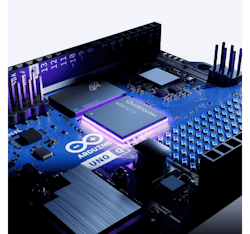Qualcomm Technologies adds Arduino’s open-source hardware and software to its growing technology fold
Qualcomm Technologies is acquiring Arduino, an open-source hardware and software provider popular with the maker community that has inched its way into industrial applications over the years. The transaction is designed to accelerate Qualcomm Technologies’ strategy to empower developers by facilitating access to its portfolio of edge technologies and products. This acquisition builds on the company’s recent integrations of Edge Impulse, known for its artificial intelligence (AI) platform, and Foundries.io, known for its Linux-based DevOps platform. The closing of the acquisition is subject to regulatory approval and other customary closing conditions.
By combining its processing, graphics, computer vision and AI with Arduino’s simplicity, affordability and community, Qualcomm plans to supercharge developer productivity across industries. Arduino will preserve its open approach and community spirit while unlocking a full‑stack platform for modern development, with Arduino Uno Q as the first step. The Uno Q dual-brain platform interconnects a Linux Debian-capable Qualcomm Dragonwing QRB2210 microprocessor (MPU) with a real-time STM32U585 microcontroller (MCU).
Following the acquisition, the more than 33 million active users in the Arduino community will gain access to Qualcomm Technologies’ technology stack and global support of technologies through its partner ecosystem. Arduino sold its 10 millionth Uno board in 2021.
Arduino entered into a System Integrator Partnership agreement with DMC in 2023.
In addition to maintaining compatibility with the Arduino integrated development environment (IDE) and Uno ecosystem, the Uno Q is the first Arduino board to work with Arduino App Lab, an IDE built to unify the Arduino development journey across real-time OS, Linux, Python and AI flows. App Lab is an open-source platform. Integration of App Lab with the Edge Impulse platform is designed to streamline the building, fine-tuning and optimizing of AI models using real-world data for a wide range of capabilities such as object/human detection, anomaly detection, image classification, ambient sound recognition and keyword spotting.
“With our acquisitions of Foundries.io, Edge Impulse, and now Arduino, we are accelerating our vision to democratize access to our leading‑edge AI and computing products for the global developer community,” said Nakul Duggal, group general manager, automotive, industrial and embedded IoT, Qualcomm Technologies.
“Arduino has built a vibrant global community of developers and creators,” continued Duggal. “By combining their open-source ethos with Qualcomm Technologies’ portfolio of leading edge products and technologies, we’re helping enable millions of developers to create intelligent solutions faster and more efficiently, including a path toward global commercialization by leveraging the scale of our ecosystem.”
Arduino CEO Fabio Violante added: “Joining forces with Qualcomm Technologies allows us to supercharge our commitment to accessibility and innovation. The launch of Uno Q is just the beginning. We’re excited to empower our global community with powerful tools that make AI development intuitive, scalable, and open to everyone.”
Arduino Co-founder Massimo Banzi noted: “Our passion for simplicity, affordability and community gave rise to a movement that changed technology. By joining Qualcomm Technologies, we’ll bring cutting-edge AI tools to our community while staying true to what has always mattered most to us.”

